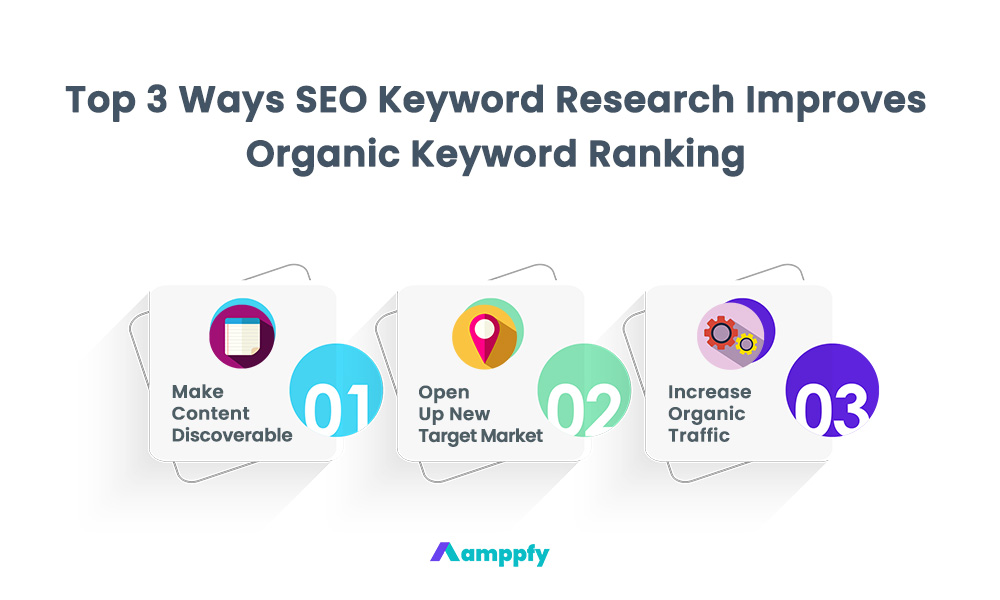Share via:

-
Save
SEO keyword research has evolved in the last decade. Ever since the launch of algorithms like Google Rankbrain and Google Core Web Vitals, the way people find information online is changing with the advanced development of AI/ML intuitive conversational search. This means search engines are becoming better at understanding the intent behind a search query instead of focusing only on the face value of words.
What is SEO Keyword Research?
SEO (Search Engine Optimization) is the organic or natural way to bring traffic to a website without spending money to run advertisements. The main objective of SEO keyword research is to find out what visitors are typing into search engines like Google to look up content, products, or services similar to what you offer on a website.
By identifying these keywords and incorporating them into website content, you are improving visibility, brand exposure, and creating more organic traffic for a website through search. The bottom line is that proper keyword research puts content in front of a targeted audience while driving more free traffic to a website.
Why is SEO Keyword Research Important for Content Marketing and Organic Search Ranking?
Google’s ever-changing search algorithm affects SEO keyword research. It changes the way we optimize website content for search. SEO is no longer just about ranking and has become a UX (User Experience) focused practice. Keyword research for SEO emphasizes connecting the right website content to what people, not search engines, are looking for and the intent behind the search. So it is imperative to focus on how keyword research is performed to maximize content optimization and improve user experience.
How to Do Keyword Research for SEO?
Finding high search volume keywords for website content can be quickly done with the right keyword research tool. Try starting keyword research with free tools like Google Search Console. As your website grows, look into advanced keyword research tools that give you more dynamic and analytical data.
Advantages of an Advanced SEO Keyword Research Tool
With advanced keyword research tools like Semrush, you can uncover a list of keywords your competitors are ranking for and identify what kind of backlinks they receive. This in-depth data paints a good picture of where you stand, how to capture more market shares, and how to strategize the SEO game plan going forward.
Example of How to Do Keyword Research for SEO
Let’s try a quick keyword research with Semrush to demo what type of data can be uncovered with the tool.
How to do SEO Keyword Research with Semrush
- Make a list of keywords to optimize a piece of content.
- Type into the search bar one keyword at a time to get results.
- Refer to “Volume” under “Organic Search.”
- Refer to the “Related Keyword” and identify low-competition keyword variations with high search volume.
- Under “Organic Search Results,” the tool lists the top 100 websites that rank for the same keyword you’ve just searched.
- The rule of thumb is to pick the keyword variation with the highest search volume and the lowest competition.
- Repeat the process for every keyword you want to rank for.

-
Save
Best for SEO Marketing.
5.0 Amppfy Rating
- Discover all the best keywords to target and bring traffic to a website through Semrush keyword research tool.
- Audit webpages and suggest ideas to improve landing page health and SEO performance.
- Optimize a website for local searches to increase local customer traffic.
- Track daily changes of keywords important to marketing.
- Find unexploited opportunities to strengthen website backlink profile.
- Uncover all the keywords and content in competitors’ SEO strategies.
- Track hundreds of relevant keywords and their Google rankings on a daily basis.
- Easily research keywords that have search volume relevant to any blog or website.
- Page-by-page SEO analysis to consistently improve organic SEO rankings.
Semrush
SEO, PPC, and research tools.-
5 projects
-
500 keywords to track
-
10,000 results per report
Top 3 Ways SEO Keyword Research Improves Organic Keyword Ranking

-
Save
#1. SEO Keyword Research Makes Content Discoverable
Content is one of the most important components that drive traffic to a website, and keyword research is the critical step to search-optimize content. Content with relevant keywords improves brand authority and website visibility, increasing organic traffic over time.
The Proper Way to Do SEO Keyword Research
Content optimization does not equal keyword stuffing. Repeating or overusing keywords results in adverse effects. Google Search Essentials outlines spam policies on bad SEO practices.
How to Do SEO Keyword Research in 3 Steps
- Focus on creating quality content.
- Build a list of words and phrases relevant to the content.
- Refine this list with keyword research tools like Semrush to optimize content and improve search visibility.
SEO Keyword Research and Content Optimization Go Together
Keyword research and content optimization go hand in hand. No tricks or tactics can guarantee an instant win overnight. However, with a consistent effort to keyword-optimize content, you are on the right track to long-term SEO success.
Learn more about how to keyword optimize H1, H2, and H3 Headings for SEO Content Marketing.
#2. SEO Keyword Research Opens Up New Target Market
Take advantage of SEO long-tail keywords to uncover lucrative new markets. Long-tail keywords are keyword-containing phrases that typically yield lower search volume but provide a more precise intent behind the searched term.
The Benefits of SEO Long Tail Keywords
Unlike head terms (popular or most searched keywords), long-tail keywords are usually less competitive and target more specific search queries. Long-tail keywords indicate visitors are more specific in their search goals.
Example of SEO Long Tail Keywords
For example, someone searching for an “organic vanilla gourmet cupcake” is more likely to engage with the targeted content than someone looking up “cupcake.”
Take the time to find these long-tail keywords related to your business and add them to the keyword list for tracking. Try searching for a long-tail keyword related to your product or service for free with Semrush, and see what potential new markets you can uncover.
#3. SEO Keyword Research Increases Organic Traffic
Earning top keyword rankings in organic search is the ultimate goal for every marketer. More “organic” or free traffic means saving significant advertising budget and spending less on paid search engine marketing keywords you are already winning.
Identify Industry-Specific SEO Keywords
A good tip is to use Semrush keyword research tool to find industry-specific keywords or phrases with high search volume.
Example of Industry Specific SEO Keywords
For example, if you sell toy cars and try to win the market for the toy car models you carry, think about search terms that can relate to a broader group of target audience. Let’s say you are selling toy cars, incorporate keywords such as “remote-controlled toy cars,” “electric toy car with long battery life,” or “race car toys” as long-tail keywords.
SEO Keyword Research is a Long Term Digital Marketing Strategy
Track the keyword research results and pay attention to the markets where you gain the most momentum. Periodically access the original keyword list while testing for new ones as your website gains authority.
Continue the Learning Journey with Amppfy
Amppfy’s digital marketing resource library is beginner-friendly, and zero technical or marketing experience is required to get started. Learn how to create a practical, actionable, and programmatic digital marketing playbook for any business website, e-commerce store, or content platform. Leverage effective SEO, SEM, and social media strategies to boost brand authority, increase online visibility, and generate quality demand.
Follow us on LinkedIn, Facebook, Instagram, and YouTube to stay updated on the latest marketing news, strategies, and free content.
Get Started with Free Generative AI Marketing Tools
- 100% Free
- No Account Required
- Available 24/7
Share via:





